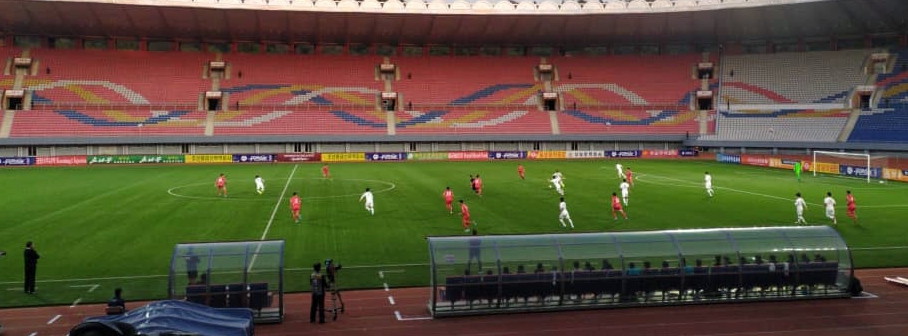 |
|
The South Korean national football team plays North Korea in empty Kim Il-sung Stadium in Pyongyang for a 2022 World Cup qualifier on Oct. 15. (Yonhap News)
|
Blue House concerned no-fan game may undermine public support for inter-Korean relations
After taking a beating over the controversial appointment of Cho Kuk as Justice Minister, the Blue House is facing another dilemma: the chill in inter-Korean relations. Seoul’s relations with Pyongyang have been strained since the second North Korea-US summit in Hanoi this past February. That strain became even more evident when a World Cup qualifying match in Pyongyang was played before empty stands, putting the Blue House in an awkward position. A senior official at the Blue House said on Oct. 16 that it was “extremely unfortunate and disappointing” that no fans were allowed to watch the game between the South and North Korean football teams. “Sports have often paved the way to peace, and I think that many Koreans expected that sports would play that role [once again]. [The government] did the best that it could, but it’s a real shame that we couldn’t make that happen,” the official said in a meeting with reporters. For the Blue House, the most agonizing aspect of this whole affair was that the no-fan game on Oct. 15 was a World Cup qualifier. South Koreans had been greatly excited about the game, and now they’ve seen for themselves how chilly inter-Korean relations have become. The Blue House is concerned that the game will undermine the public support that is essential for pushing ahead with the Korean Peninsula Peace Process, which is already at a standstill. During his speech at the UN General Assembly in New York last month, South Korean President Moon Jae-in called for the creation of an international peace zone in the DMZ and pushed for the resumption of North Korea-US dialogue during his meeting with US President Donald Trump, but the situation remains unchanged. North Korea also declared a breakdown in working-level talks with the US that took place in Stockholm, Sweden, on Oct. 5. Despite North Korea’s repeated short-range missile launches and North Korean officials’ criticism of Moon, the Blue House has insisted that trust between the leaders of South and North Korea remains firm. But that declaration is starting to ring hollow; recent reports have shown that inter-Korean channels of communication, including the inter-Korean liaison office at Kaesong, aren’t functioning properly. If the current trend continues, North Korean leader Kim Jong-un probably won’t visit Busan for the ASEAN summit this November, and the push for South and North Korea to cohost the 2032 Olympics is likely to lose steam. The no-fan game was “extremely upsetting,” one Blue House official said, adding that “it’s likely to have a grave effect on public opinion.” For such reasons, people at the Blue House are asserting the need to be more proactive in trying to bring North Korea around. Since the second North Korea-US summit ended without an agreement, Moon and the Blue House have kept their distance from North Korea-US relations. There’s been a noticeable decline in the frequency of remarks about South Korea serving as a mediator or facilitator in Pyongyang’s negotiations with Washington. In the face of American intransigence, critics say, South Korea has softened its calls for the US to ease sanctions on North Korea or grant permission for more inter-Korean economic cooperation. “We have to simultaneously win over the US and North Korea. I think the time has come for us to look into more creative ideas,” one Blue House official said. By Seong Yeon-cheol, staff reporter Please direct comments or questions to [english@hani.co.kr]






